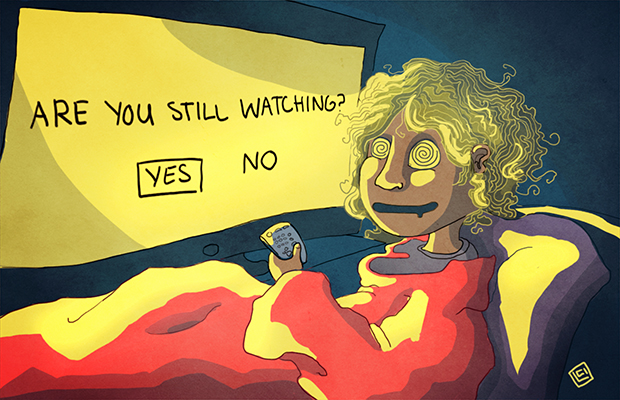December 1st, 2017 •
Comments Off on Are These 10 Bad Habits Making You Feel Stressed?

It’s fair to say that modern life causes huge amounts of stress and anxiety. Whether it’s problems at work, exam stress, relationship difficulties or worries over how you’re going to pay the next bill, stress is a simple fact of everyday life and something we all have to deal with. But did you know that many of us only compound our stress levels through our bad habits? If you want to reduce stress and make your life easier, these are the ten things you should tackle right now.
-
Procrastination
There’s nearly always something we just don’t want to face – and we’ll do literally anything to avoid doing it! Why get stuck into the year-end accounts when you can sit watching cute cats on YouTube?
The trouble is, procrastination only amplifies stress and anxiety. You feel guilty because you’re not doing what you’re supposed to be doing, and you just can’t get stuff off your mind until it’s done.
If you’re a serial procrastinator, one thing that can really help is to plan things out in advance. Make a list of the things you need to do and decide when you’re going to do each one. When you’ve ticked off each task, give yourself a small reward and a pat on the back for a job well done.
-
Social Media Checking
This is a big one! In a world where social media dominates our lives, it’s all too easy to spend all day checking in on Facebook, Twitter and Instagram.
But while social media is a great tool, it’s also important to realize that too much of it can cause stress, anxiety and depression. Research has found that social media increases stress levels and negatively affect a person’s sense of self worth.
With this in mind, it is important to take regular breaks from social media. Try to limit yourself to so many minutes or hours of social media each day, and schedule in time when you don’t look at it at all – perhaps for one day each week, or a whole weekend.
-
Binge Watching Box Sets
Let’s face it: we’re all slightly guilty of spending too much time watching TV or hibernating away to watch the latest box set on Netflix!
But while you might think that TV helps you to relax, the actual truth is that it can damage your health. In fact, many recent studies reveal that sitting too much and being sedentary will shorten your lifespan, contribute to the development of chronic diseases and diminish quality of life. The human body is an amazing and fascinating organism which is designed to move!
We’re not saying that you should avoid watching TV completely, but it’s definitely a good idea to limit yourself to so many hours a day. Making more time for other activities like walking, reading and hobbies will make you feel a whole lot better.

-
Drinking Too Much Coffee
Many of us find it difficult to start the day without getting our morning caffeine fix. The stresses and strains of modern life lead us to grab a comforting cup of java every time we need a pick-me-up, but you should also know that too much caffeine seriously affects your stress levels because of the way it stimulates stress hormones.
If you’re noticing yourself feeling more stressed or anxious than usual, it could be time to give up your daily Starbucks habit and limit the amount of coffee you consume each day. Instead, try to drink more water or fresh smoothies – and remember to exercise regularly. Supplements can also help to give your energy levels a boost without the side effects of caffeine.
-
Building Up Clutter
You’ve probably heard of the expression “tidy house, tidy mind” – and it’s absolutely true! Research by the University of California found that people who described their home environment as chaotic or messy had higher levels of the stress hormone, cortisol. In short, you might find it difficult to get anything done when you’re surrounded by clutter.
If your home has become an untidy mess, it might be time to do something about it. Throw away anything you don’t need, and find a dedicated space for the things you do.
In addition, don’t just limit the de-cluttering to items in your home. Tidying up your computer desktop and deleting unwanted apps from your phone helps to reduce stress and make your life easier.
-
Self-Deprecating
You’ll happily put yourself down or make yourself the butt of a joke. After all, nobody likes someone who always brags about how wonderful they are…
But do you realize that you’re actually doing yourself a great deal of harm? Dissing yourself causes lots of stress and anxiety, and it can also lead to depression. If you always point out your flaws and tell everyone how stupid you think you are, you’ll eventually start to believe it – and other people will, too.
So, it’s time to stop it right now and instead focus on what you’re good at. Be proud of your talents and achievements, and embrace your flaws.
-
Telling Fibs
You might think that there’s no harm in telling a little white lie every now and again, but the truth is that fibbing is actually really bad for your mental health.
Research has shown that dishonesty leads to stress, unhappiness and feelings of sadness, with more lies resulting in increased mental health issues. When you also consider that on average we tell four fibs a day, it’s easy to see how those small untruths can soon add up to a big problem.
If you’re in the habit of frequently telling porky pies, it’s time to acknowledge the problem and make an effort to do it less. It’s true what they say: Honesty really is the best policy!
-
Trying to be a People Pleaser
Are you one of those people who finds it difficult to say “no” to anything? Maybe you always put other people’s needs ahead of your own or feel like you have to do everything because it’s expected?
In truth, people pleasing causes lots of unwanted stress and anxiety. It means you end up spending all your time looking after other people and never having enough time to do the things you want to do yourself.
If you want to be happier, you need to learn to say “no” more often. You simply can’t do everything or please everyone in life – and neither should you try!
-
Not Looking After Yourself
Life is stressful, and regular “me time” is essential for good health and wellbeing. Unfortunately, it is also often the thing that gets relegated to the bottom of the list when life gets hectic.
No matter how busy you are, you should always make time for yourself and make an effort to do the things you enjoy. It could be relaxing in the bath, going for a massage, or simply taking a short walk in the fresh air. You’ll feel a whole lot better, and you’ll be more ready than ever to tackle whatever life throws at you.
-
Overthinking Everything
It’s easy to over analyze things. Whether it’s questioning whether you’re making the right decision or stressing over “what ifs,” we’re all guilty of overthinking things from time to time. It’s a bad habit to get into because it causes a great deal of stress and anxiety.
Instead of overthinking, try to focus on the present moment. Believe that everything happens for a reason, and tackle life’s challenges one by one as you reach them. It’s really the only way to live.













